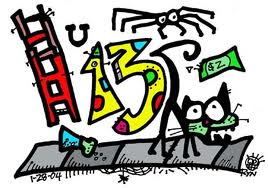
This article was published for the first time in January 2010 in a blog entitled “Ravings from the Rev”:
OK, so one of the things I definitely feel the need to rave about is the whole concept of superstition. For one thing, it’s one of those words that is amazingly pejorative, but in a sneaky kind of way. When you tell someone that they are being superstitious, you are not only telling them that they are an idiot about a particular subject, but also that their whole thinking process is flawed. And to make matters worse, the underlying assumption is that, by contrast, you are a superior person by virtue of your ability to reason.
Superstition comes from the Latin superstitio, translated as “amazement or wonder of the divine or the supernatural.” Originally, the concept was applied by the Romans towards the people they conquered who did not share their committment to the Roman pantheon of Gods. Over time, after the Romans themselves were conquered culturally by that exciting new group of religious zealots who called themselves Christians, superstition became associated with the indigenous pagan religions that were Christianity’s main threat to expansion. As the centuries went by and Christianity established itself as the prevailing–and mandatory–religious belief system in Europe, superstition became any belief in opposition to Christianity.
The Scientific Revolution in Europe further expanded–and muddied–the doctrinal waters. Eventually we evolved into the contemporary situation where many Christians and other religious folks view science with skepticism or even horror, seeing it as full of superstitions like evolution and global warming; while many scientists and their admirers think religion one mass collection of delusions. And of course, both science and orthodox religion trivialize indigenous spiritual perspectives as “folklore,” i.e. the stuff of “primitives” who are not advanced enough to participate in true faith.
I believe the core of this debate is an essential epistemological question. Who has the right to define what is Truth, with a capital T? One might answer that only God does. Then, who among us gets to interpret the ways of the divine and how that Truth is made manifest? Or said in a way that takes out the controversial “G” word altogether, who gets to interpret the ways of the natural world and come to conclusions about its order?
Should we allow the reductionist paradigm of science to judge the big picture? “I can do without the superstition” says Capt. Jack Harkness of the BBC Torchwood series. “You people love any story that denies the randomness of existence,” (Season 1, Episode 1). Now I love Capt. Jack but he has his blind spots. Should we allow popular religious leaders to interpret the actions of the ineffable through their limited human understanding? Personally, I found television evangelical Pat Robertson’s recent comments attributing the suffering of the Haitian people after the earthquake to their pact with the Devil outrageous, and highly unChristian.
Let’s make our own pact. Let’s all be superstitious, that is to say, full of wonder at the created order, irrespective of what you think that order looks like; or who or what you think created it. And as to the details, since one person’s superstitions could very well be another person’s cherished beliefs, let’s cut out the judgment of which is which. No, I don’t believe that breaking a glass brings me seven years of bad luck. But if you do, that’s fine with me.
Copyright 2010 Rev. Resa Eileen Raven
 OK, so one of the things I definitely feel the need to rave about is the whole concept of superstition. For one thing, it’s one of those words that is amazingly pejorative, but in a sneaky kind of way. When you tell someone that they are being superstitious, you are not only telling them that they are an idiot about a particular subject, but also that their whole thinking process is flawed. And to make matters worse, the underlying assumption is that, by contrast, you are a superior person by virtue of your ability to reason.
OK, so one of the things I definitely feel the need to rave about is the whole concept of superstition. For one thing, it’s one of those words that is amazingly pejorative, but in a sneaky kind of way. When you tell someone that they are being superstitious, you are not only telling them that they are an idiot about a particular subject, but also that their whole thinking process is flawed. And to make matters worse, the underlying assumption is that, by contrast, you are a superior person by virtue of your ability to reason.
You must be logged in to post a comment.